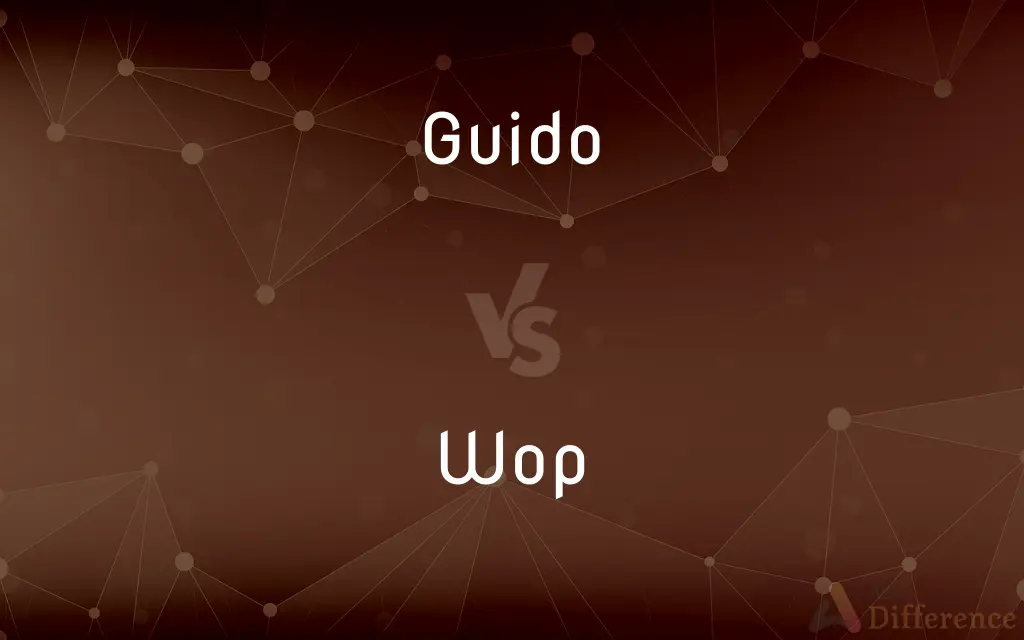Guido vs. Wop — What's the Difference?
By Maham Liaqat & Urooj Arif — Updated on April 20, 2024
"Guido" and "wop" are both slang terms with pejorative connotations. "Guido" is often used to describe an Italian-American male with a working-class urban background. "Wop," on the other hand, is a derogatory term historically used to insult Italians.

Difference Between Guido and Wop
Table of Contents
ADVERTISEMENT
Key Differences
"Guido" is a term that gained popularity particularly in the United States to characterize Italian-American males embodying a specific subcultural style, including slicked-back hair, gold chains, and a muscular physique, often associated with certain behaviors like club-going. It is considered offensive by many due to its stereotypical and derogatory implications. Meanwhile, "wop" is an outright ethnic slur against Italians, originating from the Neapolitan word "guappo," meaning a swaggering thug. Its use is highly offensive and reflects anti-Italian discrimination.
The use of "Guido" can be context-dependent, sometimes embraced within certain groups for self-identification but generally regarded as pejorative outside of these circles. "Wop" has no such flexibility and has been universally condemned as an ethnic slur. Both terms are problematic, but "wop" carries a more unambiguously derogatory and historically charged weight.
"Guido" also has cultural implications, representing a specific subcultural identity within Italian-American communities that has been both critiqued and celebrated in media, notably on television shows like "Jersey Shore." In contrast, "wop" is devoid of any cultural appreciation and is used solely as an insult.
While some individuals within the "Guido" subculture may reclaim the term as a badge of pride, representing their lifestyle and choices, there is no comparable movement for "wop," which remains offensive in all contexts. The distinction between these terms lies in their usage and acceptance: "Guido" might be seen in a more neutral or even positive light by some, whereas "wop" is always derogatory.
Comparison Chart
Definition
Slang for a flashy Italian-American male from urban areas
Derogatory slur for an Italian person
ADVERTISEMENT
Connotation
Often pejorative, but can be used neutrally or positively
Universally derogatory and offensive
Cultural Ties
Associated with a specific subculture and lifestyle
No positive cultural ties, purely an insult
Usage Context
Can be self-referential within the community, media portrayals
Always offensive, with no acceptable use
Historical Context
Emerged in media and subcultures in late 20th century
Dates back to early 20th century immigration waves
Compare with Definitions
Guido
Stereotypical term for an Italian-American man with distinctive urban, flashy style.
He was often labeled a Guido because of his gelled hair and gold chains.
Wop
Offensive term used against Italians, implying negative stereotypes.
He was hurt by the use of wop in a derogatory comment.
Guido
Sometimes reclaimed within the community as a proud identifier.
He embraced the Guido label, seeing it as a celebration of his cultural identity.
Wop
Lacks any positive or reclaimed usage.
Unlike some other terms, wop has not been reclaimed and remains purely offensive.
Guido
Can denote certain lifestyle traits associated with nightclubs and the party scene.
The club was popular among Guidos who enjoyed the lively dance scene.
Wop
Historically used to demean Italian immigrants in America.
The term wop was a common insult during the early 20th century.
Guido
May carry pejorative connotations but is also used humorously or affectionately within certain contexts.
They jokingly referred to their group as the Guido squad during nights out.
Wop
Carries a strong negative stigma and is considered highly offensive.
The anti-discrimination campaign targeted ethnic slurs, including wop.
Guido
Depicted in media as a specific subcultural figure.
The reality show featured several Guidos, highlighting their unique fashion and behavior.
Wop
Reflects broader patterns of ethnic prejudice and discrimination.
The use of slurs like wop illustrated the challenges faced by Italian communities in asserting their rights and dignity.
Guido
Guido is a given name Latinised from the Old High German name Wido. It originated in Medieval Italy.
Wop
Wop is a pejorative slur for Italians or people of Italian descent.
Guido
A stereotypical working-class or lower-class and usually urban-dwelling Italian-American male; sometimes more generally a stereotypical Italian or person of Italian descent
Wop
Used as a disparaging term for a person of Italian birth or ancestry.
Guido
A guidance officer.
Wop
A person of Italian descent.
Wop
Offensive terms for a person of Italian descent
Common Curiosities
Why is "Guido" considered offensive by some?
"Guido" is seen as offensive due to its stereotypical portrayal of Italian-American men, reducing their identities to shallow cultural clichés.
What is the origin of the term "wop"?
"Wop" derives from "guappo," a Neapolitan slang term for a swaggering thug, used pejoratively against Italians in America.
Has the use of "Guido" changed over time?
Yes, the use of "Guido" has evolved, especially with media influence. Initially more pejorative, it has seen periods of reclamation where individuals within the Italian-American community have adopted the term with a sense of pride. However, it remains controversial and is considered offensive by others within the community.
Are there any movements or groups actively working to reclaim or disavow these terms?
There are no significant movements to reclaim "wop" due to its deeply offensive nature, but there are Italian-American cultural and advocacy groups that actively discourage its use and educate about its offensive history. For "Guido," the situation is more nuanced with some younger members of the community attempting to reclaim or neutralize the term, often within specific social or media contexts.
Is there ever an appropriate context to use "wop"?
No, "wop" is considered an ethnic slur and should be avoided in all contexts due to its derogatory nature.
How have media portrayals affected the perception of the term "Guido"?
Media portrayals, such as on the show "Jersey Shore," have popularized and sometimes glamorized the "Guido" lifestyle, affecting both positive and negative perceptions of the term.
Can "Guido" be a term of endearment or pride?
In some contexts, individuals may use "Guido" to express pride or affection within their community, though it is not universally accepted.
How does popular culture influence the perception of terms like "Guido"?
Popular culture, particularly reality TV and films, has a significant impact on shaping and sometimes reinforcing stereotypes associated with terms like "Guido." Shows like "Jersey Shore" have popularized the "Guido" lifestyle, making it a recognizable, though often controversial, cultural identity. This media portrayal can influence both public perception and the self-identity of the people labeled by such terms.
What impact does the use of terms like "Guido" and "wop" have on the Italian-American community?
These terms can perpetuate stereotypes and contribute to cultural misunderstandings. While "Guido" might be embraced by some as part of a subcultural identity, "wop" is universally seen as derogatory and harmful, reinforcing negative biases and affecting how Italian-Americans are viewed and treated in society.
What are the legal or social repercussions of using a term like "wop" in public or professional settings?
Using "wop" in public or professional settings can be considered hate speech and lead to serious social and professional repercussions, including workplace disciplinary actions, loss of job opportunities, and public censure. It is widely regarded as inappropriate and offensive, with potential legal consequences under anti-discrimination laws, especially in professional environments.
Share Your Discovery

Previous Comparison
Director vs. Coordinator
Next Comparison
Connection vs. InterconnectionAuthor Spotlight
Written by
Maham LiaqatCo-written by
Urooj ArifUrooj is a skilled content writer at Ask Difference, known for her exceptional ability to simplify complex topics into engaging and informative content. With a passion for research and a flair for clear, concise writing, she consistently delivers articles that resonate with our diverse audience.














































